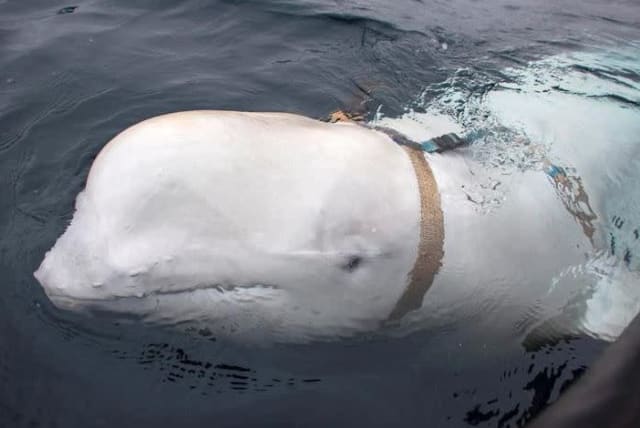Stay away from Russian spy whale, Norway warns beachgoers

The whale, nicknamed Hvaldimir, became famous in 2019 after it was spotted wearing a specially made harness with mounts for a camera.
The Norwegian Directorate of Fisheries has advised beachgoers to "avoid contact" with a well-known beluga whale that's suspected of being used for Russian espionage.
The warning comes in response to the whale's travels to a densely populated area, putting him at far greater risk of injury or death. The whale, nicknamed Hvaldimir, became famous in 2019 after it was spotted wearing a specially made harness with mounts for a camera, leading to the "Russian spy" allegations.
When first discovered, the whale swam to the boats and attempted to actively engage the attention of the humans by pulling ropes from the side of the boats. The men found he was wearing a tight harness which might be used to strap-on a camera or weapon, absent in this case. "Property of St. Petersburg” was written on the harness.
Martin Biuw of the Institute of Marine Research in Norway said at the time it’s the Russian Navy, not the Russian academy, which is likely to train whales in such a way.
The Soviet military training program for dolphins operated from the 1980s to the 1990s. Yet in 2017, Russian television aired a program announcing that the Russian navy is training beluga whales, seals and bottlenose dolphins.
Since 2019, Hvaldimir "has been traveling along the Norwegian coast,” according to the Norwegian Directorate of Fisheries.
In a statement on Wednesday, Fisheries Director Frank Bakke-Jensen said that “so far there have only been minor incidents where the whale has suffered minor injuries, primarily from contact with boats," urging people to stay away “even though the whale is tame and used to being around people.”
“We especially encourage people in boats to keep a good distance to avoid the whale being injured or, in the worst case, killed by boat traffic,” said Bakke-Jensen.
What's next for Hvaldimir?
Now that the beluga whale is in a more vulnerable area, Bakke-Jensen said various measures are being considered to protect the animal. Placing it in captivity would be a last resort.
“But it is too early to say anything concrete about that yet," he said.
Hagay Hacohen contributed to this report.
Jerusalem Post Store
`; document.getElementById("linkPremium").innerHTML = cont; var divWithLink = document.getElementById("premium-link"); if (divWithLink !== null && divWithLink !== 'undefined') { divWithLink.style.border = "solid 1px #cb0f3e"; divWithLink.style.textAlign = "center"; divWithLink.style.marginBottom = "15px"; divWithLink.style.marginTop = "15px"; divWithLink.style.width = "100%"; divWithLink.style.backgroundColor = "#122952"; divWithLink.style.color = "#ffffff"; divWithLink.style.lineHeight = "1.5"; } } (function (v, i) { });

